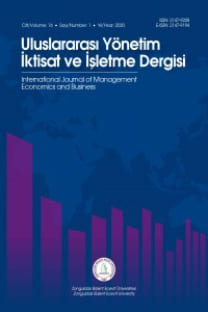Ekonomik Durgunluk Dönemlerinde Tüketicilerin Satın Alma Davranışında Yaşanan Değişimlerin Analizi
Ekonomik Durgunluk, Tüketici Davranışları, Başa Çıkma Stratejileri
ANALYSISOF THE CHANGES IN CONSUMERS’PURCHASING BEHAVIORS IN THE PERIODS OF ECONOMIC RECESSION
Economic Stagnation, Consumer Behaviors, Coping Strategies,
___
- Ang, Swee Hoon, Siew Meng Leong and Philip Kotler (2000), ―The Asian Apocalypse: Crisis Marketing for Consumers and Businesses‖, Long Range Planning, Vol. 33, 97-119.
- Ang, Swee Hoon (2001a), ―Crisis Marketing: A Comparison Across Economic Scenarios‖, International Business Review Elsevier Science Ltd., Vol. 10, 263- 284.
- Ang, Swee Hoon (2001b), ―Personality Influences on Consumption: Insights from the Asian Economic Crisis‖, Journal of International Consumer Marketing, Vol. 13 (1), 5-20.
- Annon (1975), ―Marketing in a Recession: Comments from Our Readers‖, Journal of Marketing, Vol. 39, 78-79.
- Belk, Russell W. (1984), ―Three Scales to Measure and Constructs Related to Materialism: Reliability, Validity and Relationships to Measures of Happiness‖, Advances in Consumer Research, Vol. 11, 291-297.
- Belk, Russel W. (1985), ―Materialism: Trait Aspects of Living the Material World‖, Journal of Consumer Research, Vol. 12 (3), 265-280.
- Eğilmez, Mafi (2009), Küresel Finansal Kriz, Remzi Kitabevi, İstanbul.
- Fraj, Elena and Eva Martinez (2006), ―Environmental Values and Lifestyles as Determining Factors of Ecological Consumer Behavior: An Empirical Analysis”, Journal of Consumer Marketing, Vol. 23 (3), 133-144.
- Fiszbein, Ariel, Paula Giovagnoli and Norman Thurston (2002), ―Household Behavior in the Presence of Economic Crisis: Evidence from Argentina‖, IBOPE, 1-23.
- Fiszbein, Ariel, Paula Giovagnoli and Isidro Aduriz (2003), ―The Argentine Crisis and Its Impact on Household Welfare‖, Cepal Review, Vol. 79, April.
- Gunnarsson, Jonas and Richard Wahlund (1996), ―Household Financial Strategies in Sweden: An Exploratory Study the Foundation for Distribution Research‖, Journal of Economic Psychology, December, 201-233.
- Iwata, Osamu (2006), ―An Evaluation of Consumerism and Lifestyle as Correlates of a Voluntary Simplicity Lifestyle‖, Social Behavior and Personality, Vol. 34 (5), 557-568.
- Lichtenstein, Donald, R. Netemeyer, G. Richard and Scot Burton (1990), ―Distinguishing Coupon Proneness from Value Consciousness: An Acquisition- Transaction Utility Theory Perspective‖, Journal of Marketing, Vol. 54, 57-67.
- Lokshin, Michael and Ruslan Yemtsov (2004), ―Household Strategies of Coping with Shocks in Post-Crisis Russia‖, Review of Development Economics, Vol. 8 (1), 15-32.
- Mandell, M. (1998), ―Asia: Converting Crisis to Opportunity‖, World Trade, April, 36- 39.
- Milanova, Elena (1999), ―Consumer Behavior in an Economy in Distress‖, Advances in Consumer Research, Vol. 26, 424-430.
- Okumuş, Fevzi, Mehmet Altinay ve Hüseyin Arasli (2005), ―The Impact of Turkey‘s Economic Crisis of February 2001 On the Tourism Industry in Northern Cyprus‖, Tourism Management, Vol. 26, 95-104.
- Özgül, Engin (2008), ―Tüketicilerin Değer Yönelimleri, Gönüllü Basit Yaşam Tarzı ve Sürdürebilir Tüketim Üzerindeki Etkileri‖, 13. Pazarlama Kongresi, Adana, 373-393.
- Özdamar, K. (1999), Paket Programları ile İstatistiksel Veri Analizi-1, Kaan Kitapevi, 2. Baskı, Eskişehir.
- Price Linda, Ridgway, Nancy M. (1983) ―Development of a Scale to Measure Use Innovativeness‖ In Bearden William, Netemeyer, Richard G. (1999) Handbook of Marketing Scales: Multi-Item Measures for Marketing and Consumer Behavior Research, 2. Ed., Sage Publication, London.
- Richins, Marsha L. (1987), ―Media, Materialism and Human Happiness‖, Advances in Consumer Research, Vol. 14, 352-356.
- Richins, Marsha L. and S. Dawson (1992), ―A Consumer Values Orientation for Materialism and Its Measurement: Scale Development and Validation‖, Journal of Consumer Research, Vol. 19 (3), 303-316.
- Richins, Marsha L., K. K. R. McKeage and D. Najjar (1992), ―An Exploration of Materialism and Consumption Related Affect‖, Advances in Consumer Research, Vol. 19, 229-236.
- Shama, Avraham (1978), ―Management & Consumers in an Era of Stagflation‖, Journal of Marketing, Vol. 42, 43-52.
- Shama, Avraham (1981), ―Coping with Stagflation: Voluntary Simplicity‖, Journal of Marketing, Vol. 45, 120-134.
- Shama, Avraham (1985), ―The Voluntary Simplicity Consumer‖, The Journal of Consumer Marketing, Vol. 2, 57-63.
- Song, K. B (1998), ―Singapore Dream Now Limited to Cash‖, The Straits Times, Vol. 7, 10.
- Sudarno, Sumarto, Anna Wetterberg and Lant Pritchett (1999), ―The Social Impact of the Crisis in Indonesia: Results from a Nationwide Kecamatan Survey‖, East Asia Environment and Social Development Unit, No: 21249, 1-39.
- Titiz, İsmet ve İlker H. ÇARIKÇI (2001), ―Krizlerin İşletmeler Üzerindeki Etkileri ve Küçük İşletme Yöneticilerinin Kriz Dönemine Yönelik Stratejik Düşünce ve Analizleri‖, Cumhuriyet Üniversitesi İktisadi ve İdari Bilimler Dergisi, Cilt 2, (1), 203-218.
- Torlak, Ömer ve Umut Koç (2007), ―Materialistic Attitude as An Antecedent of Organizational Citizenship Behavior‖, Emerald, Vol. 30 (8), 581-596.
- Uribe, Claudia. L., Sharon. B. Schweikhart, Dev S. Pathak and Gail B. Marsh (2002), ―Perceived Barriers to Medical-Error Reporting: An Exploratory Investigation‖, Journal of Healthcare Management, Vol. 47, 263-280.
- Warneryd, K. (1996), ―Risk Attitudes and Risky Behavior‖, Journal of Economic Psychology, Vol. 17 (6), 749-770.
- Zurawicki, Leon and Nestor Braidot (2005), ―Consumers during Crisis: Responses from the Middle Class in Argentina‖, Journal of Business Research, Vol. 58, 1100- 1109.
- ISSN: 2147-9208
- Yayın Aralığı: 4
- Başlangıç: 2005
- Yayıncı: Zonguldak Bülent Ecevit Üniversitesi
Türkiye’de Kooperatiflerin Hukuki Statüsü ve Vergiler Karşısındaki Durumu
Halil KIZILASLAN, Mehmet MENEK
G. Songül ERCAN, Özge CAN BAKIRLI
Türkiye’deki Kamuya Ait Yükseköğretim Kurumlarının Performansını Ölçmeye Yönelik Bir Analiz
Cemil RAKICI, Selçuk BUYRUKOĞLU
Türkiye’de Para Politikası Stratejilerinin Fiyat İstikrarına Etkisi: Enflasyon Hedeflemesi Örneği
Hüseyin DALĞAR, Ali Murat ALPARSLAN, Ömer BİNİCİ
Müze Pazarlamasında Müşteri İlişkileri ve Deneyimleri Üzerine Bir Araştırma
Mete SEZGİN, S. Burak HAŞILOĞLU, M. Emin İNAL
Döner Sermayeli İşletmelerde Özellikli Muhasebe Konuları ve Bazı Çözüm Önerileri
Türkiye’de Vergi Aflarının Vergi Gelirlerine Etkisi
Gösterge Bilim Semiyotik Tekniği Kullanilarak Kanada Fotoğraflarinin İncelenmesi
